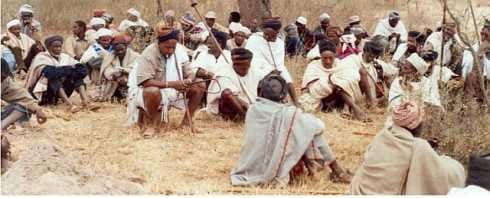
Waaqeffannaa, the traditional Oromo religion, plays a significant role in peacebuilding within Oromo communities and beyond. Rooted in the worship of Waaqa (God) and the belief in harmony with nature and all living beings, Waaqeffannaa provides a spiritual and ethical framework that promotes peace, reconciliation, and social cohesion. Below is an exploration of the role of Waaqeffannaa in peacebuilding, highlighting its principles, practices, and contributions to fostering harmony and resolving conflicts.
1. Core Principles of Waaqeffannaa in Peacebuilding
a. Harmony with Nature and Humanity
- Description: Waaqeffannaa emphasizes living in harmony with nature and all living beings, reflecting a deep respect for the interconnectedness of life.
- Role in Peacebuilding: This principle fosters a sense of unity and mutual respect, which is essential for resolving conflicts and promoting peaceful coexistence.
b. Ethical Living and Moral Integrity
- Description: Waaqeffannaa promotes ethical living, moral integrity, and the importance of maintaining balance and harmony in all aspects of life.
- Role in Peacebuilding: Ethical behavior and moral integrity are crucial for building trust and fostering reconciliation among individuals and communities.
c. Collective Responsibility (Wal-tajii)
- Description: The concept of Wal-tajii (mutual aid) emphasizes collective responsibility and mutual support within the community.
- Role in Peacebuilding: Collective responsibility encourages community members to work together to address conflicts and promote social cohesion.
d. Restorative Justice (Araara and Gumaa)
- Description: Waaqeffannaa incorporates traditional conflict resolution mechanisms, such as Araara (reconciliation) and Gumaa (restorative justice), which focus on healing, forgiveness, and restoring harmony.
- Role in Peacebuilding: These practices address conflicts in a way that promotes healing and reconciliation, rather than punishment, fostering long-term peace.
2. Practices of Waaqeffannaa in Peacebuilding
a. Rituals and Ceremonies
- Description: Waaqeffannaa rituals and ceremonies, such as prayers, offerings, and festivals, play a crucial role in promoting peace and social cohesion.
- Role in Peacebuilding: These rituals bring community members together, fostering a sense of unity and shared purpose.
- Example: The Irreechaa festival, a thanksgiving celebration, promotes gratitude, unity, and reconciliation among the Oromo people.
b. Mediation and Conflict Resolution
- Description: Waaqeffannaa provides a framework for mediation and conflict resolution through traditional practices like Araara and Gumaa.
- Role in Peacebuilding: These practices emphasize dialogue, forgiveness, and the restoration of relationships, which are essential for resolving conflicts and promoting peace.
- Example: Elders and spiritual leaders mediating disputes between families or communities through Araara practices.
c. Spiritual Guidance and Counseling
- Description: Waaqeffannaa spiritual leaders, known as Qallu or Ayyaana, provide guidance and counseling to individuals and communities.
- Role in Peacebuilding: Spiritual guidance helps individuals and communities navigate conflicts, heal from trauma, and foster reconciliation.
- Example: Offering counseling and support to individuals affected by violence or displacement.
d. Environmental Stewardship
- Description: Waaqeffannaa emphasizes the sacredness of nature and the importance of environmental conservation.
- Role in Peacebuilding: Protecting the environment and promoting sustainable practices contribute to the well-being of the community and reduce conflicts over resources.
- Example: Organizing community-led conservation projects to protect sacred natural sites and promote sustainable land use.
3. Contributions of Waaqeffannaa to Peacebuilding
a. Promoting Social Cohesion
- Description: Waaqeffannaa fosters a sense of unity and shared identity among the Oromo people, which is essential for social cohesion.
- Contribution: By promoting collective responsibility and mutual support, Waaqeffannaa helps to build strong, resilient communities that can address conflicts and challenges together.
b. Restorative Justice and Reconciliation
- Description: Waaqeffannaa’s emphasis on restorative justice and reconciliation provides a culturally relevant framework for resolving conflicts and healing relationships.
- Contribution: Restorative justice practices, such as Araara and Gumaa, promote healing and forgiveness, which are crucial for long-term peace.
c. Ethical and Moral Guidance
- Description: Waaqeffannaa provides ethical and moral guidance that promotes integrity, respect, and compassion.
- Contribution: Ethical behavior and moral integrity are essential for building trust and fostering peaceful coexistence among individuals and communities.
d. Cultural Preservation and Identity
- Description: Waaqeffannaa plays a crucial role in preserving and promoting Oromo culture, language, and traditions.
- Contribution: Cultural preservation strengthens community identity and resilience, which are important for addressing conflicts and promoting peace.
e. Holistic Well-Being
- Description: Waaqeffannaa emphasizes holistic well-being, addressing the physical, mental, spiritual, and social dimensions of life.
- Contribution: Holistic well-being promotes overall health and harmony, which are essential for sustainable peace.
4. Challenges and Opportunities
a. Modernization and Globalization
- Challenge: The erosion of traditional values and practices due to modernization and globalization poses challenges for culturally grounded peacebuilding.
- Opportunity: Integrating traditional practices with modern peacebuilding methods can create innovative and effective approaches to conflict resolution.
b. Political Marginalization
- Challenge: The Oromo people’s historical and ongoing marginalization can hinder efforts to promote peace and social justice.
- Opportunity: Advocacy for the recognition and protection of Oromo cultural and spiritual practices can contribute to broader efforts for peace and reconciliation.
c. Resource Limitations
- Challenge: Limited resources and funding can constrain efforts to promote peacebuilding initiatives.
- Opportunity: Leveraging community resources and partnerships can enhance the sustainability and impact of peacebuilding efforts.
Conclusion
Waaqeffannaa plays a vital role in peacebuilding within Oromo communities and beyond. Its principles of harmony, ethical living, collective responsibility, and restorative justice provide a strong foundation for resolving conflicts and promoting social cohesion. Through rituals, mediation, spiritual guidance, and environmental stewardship, Waaqeffannaa contributes to the well-being and resilience of the Oromo people. Despite challenges, the continued commitment to these principles offers hope for a more peaceful and harmonious future for the Oromo people and Ethiopia as a whole. By integrating traditional practices with modern peacebuilding methods, Waaqeffannaa can continue to play a crucial role in fostering sustainable peace and reconciliation.
